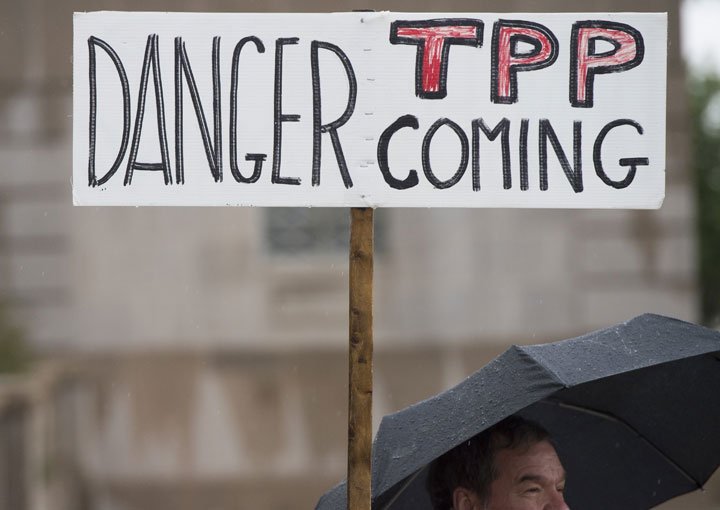Canada and 11 other major countries are nearing the final steps of enacting the Trans-Pacific Partnership (TPP), a trade agreement described by Global Trade Watch as “NAFTA on steroids.”

Meghan Sali, campaign coordinator for free expression at Open Media, says the deal will “have huge implications for labor, access to medicine and cover over 40 per cent of the global economy.”
“Free trade agreements with the likes of Brunei and Malaysia might provide some modest benefits to Canadian businesses, but Canadian trade interests are already well-covered within much of the TPP community,” wrote technology law expert Michael Geist in a blog this month.
“Indeed, the costs of the TPP are a steep price to pay given the incremental gains that come from free trade access to a handful of additional countries.”
One word of warning though: the deal is still secret. We’ve only had glimpses of the documents through leaks. Leaked drafts uploaded to Wikileaks provide some insight on what the Trans-Pacific Partnership has in store for Canada. But what could it mean for the average Canadian citizen?
Downloading digital content
Currently Canadian copyright law stipulates that the cap for liability for illegal downloads is $5,000 and $20,000 for commercial use. Canada joining the TPP could make this a criminal offense.

Get weekly money news
“It has the power to make our Internet more censored and policed, induce regulations that criminalize small-scale copyright infringement and personal use infringements,” said Sali.
Kirsten Hillman, the lead negotiator of Canada’s involvement in TPP, has yet to specify if this is being opposed or if the laws will be upheld.
Article 16 and section QQI1 of the TPP’s intellectual property chapter is an agreement for all countries involved to create legal incentives for Internet service providers to police the content of their users.
It could potentially give Internet providers the legal power to either monitor web activity, and/or allow these companies to decide for themselves whether Internet browsers can make temporary copies to your computer’s file history folder.
“There is language in the TPP which has the potential to kick people off the Internet for repeated violations, for example Twitter needing to monitor its users for copyright infringement,” said Sali.
Access to illegal information could become a crime
TPP could make penalties for computer espionage harsher.
TPP would make it an offence to have unauthorized access to secrets held on a computer system, regardless of if they are disclosed or replicated.
At the moment, laws which regulate unauthorized access to secrets pertain only to possessing and sharing these secrets with the public.
Under the TPP, simply having the capabilities necessary to retrieve these secrets would be a crime, and could increase the risks for investigative journalists or whistleblowers.
Additionally, the ‘fair use’ exception of copyright law is what allows Canadians (including students and professors) to copy parts of textbooks for educational purposes, and use this material in presentations and news articles. This is one of the stipulations that Canada could be required to alter in joining the TTP.
Potential lawsuits
The TPP could lead to more lawsuits by companies against the government, such as the one by pharmaceutical company Eli Lilly, currently suing Canada for $500 million over its patent law.
“The cost to the health care system of an expanded investor lawsuit system could be enormous as claims from other pharmaceutical companies could soon follow,” Geist noted.
Your grocery bill and medication costs
Since the 1960s, Canada has had quotas limiting food production amounts and providing high tariffs on imported goods; this ensured the Canadian need for these products is filled by Canadian farmers.
TPP acceptance would, in theory, make business less stable for farmers because the prices of these items would no longer be regulated, and the jobs no longer guaranteed to Canadians.
Policies which could change pharmaceutical sales in Canada would give individual companies the power to raise prices of medication and limit consumers’ access to cheaper, generic drugs.








Comments
Want to discuss? Please read our Commenting Policy first.